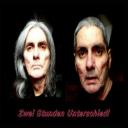Yahoo Clever wird am 4. Mai 2021 (Eastern Time, Zeitzone US-Ostküste) eingestellt. Ab dem 20. April 2021 (Eastern Time) ist die Website von Yahoo Clever nur noch im reinen Lesemodus verfügbar. Andere Yahoo Produkte oder Dienste oder Ihr Yahoo Account sind von diesen Änderungen nicht betroffen. Auf dieser Hilfeseite finden Sie weitere Informationen zur Einstellung von Yahoo Clever und dazu, wie Sie Ihre Daten herunterladen.
Wie werden Heideggers Begriffe "das Sein" und "Seiendes" im Englischen uebersetzt?
das Sein= "the Being" , gross geschrieben
Seiendes= beings?
3 Antworten
- vor 1 JahrzehntBeste Antwort
Es gibt im Englischen keine Großschreibung bei Substantivierung (wenn es nicht zu einem Eigennamen wird).
Das Sein heißt folglich being.
Seiendes heißt ebenfalls being (ohne "s", außer im Plural).
Heideggers Werk "Sein und Zeit" heißt auf Englisch "Being and Time", für "Seiendes" fällt mir als Referenz nur die Bibel ein (Hebräerbrief, Kapitel 1, Vers 3 - King James Version z.B.
- aikitzouLv 5vor 1 Jahrzehnt
Being, time, and Dasein
Heidegger’s philosophy is essentially an attempt to marry two insights.
The first of these is Heidegger’s intuition that, in the course of over two thousand years of history, philosophy has attended to all the beings that can be found in the world (including the “world” itself), but has forgotten to ask what “Being” itself is. This is Heidegger’s “question of being,” and it is Heidegger’s fundamental concern throughout his work from the beginning of his career until its end. One crucial source of this insight was Heidegger’s reading of Franz Brentano’s treatise on Aristotle’s manifold uses of the word “being,” a work which provoked Heidegger to ask what kind of unity underlies this multiplicity of uses. Heidegger opens his magnum opus, Being and Time, with a citation from Plato’s Sophist indicating that Western philosophy has neglected being because it was considered obvious, rather than as worthy of question. Heidegger’s intuition about the question of being is thus a historical argument, which in his later work becomes his concern with the “history of being,” that is, the history of the forgetting of being, which according to Heidegger requires that philosophy retrace its footsteps through a productive “destruction” of the history of philosophy.
The second intuition animating Heidegger’s philosophy derives from the influence of Edmund Husserl, a philosopher largely uninterested in questions of philosophical history. Rather, Husserl argued that all that philosophy could and should be is a description of experience (hence the phenomenological slogan, “to the things themselves”). But for Heidegger, this meant understanding that experience is always already situated in a world and in ways of being. Thus Husserl's understanding that all consciousness is "intentional" (in the sense that it is always intended toward something, and is always "about" something; intentionality has been called the "aboutness" of things) is transformed in Heidegger's philosophy, becoming the thought that all experience is grounded in "care." This is the basis of Heidegger’s “existential analytic,” as he develops it in Being and Time. Heidegger argues that to be able to describe experience properly means finding the being for whom such a description might matter. Heidegger thus conducts his description of experience with reference to “Dasein” (German Da—there/here; Sein—being; Dasein—existence), the being for whom being is a question, a being who is not man but who is nothing other than man. In the course of his existential analytic, Heidegger argues that Dasein, thrown into the world, is therefore thrown into its possibilities, including the possibility and inevitability of one’s own mortality. The need for Dasein to assume these possibilities, that is, the need to be responsible for one’s own existence, is the basis of Heidegger’s notions of authenticity and resoluteness—that is, of those specific possibilities for Dasein which depend on escaping the “vulgar” temporality of calculation and of public life.
- *woody*Lv 5vor 1 Jahrzehnt
(das Sein) > (the) being
Seiendes
das Seiende > "that which is, or some specific thing that is".
Quelle(n): Leo http://dict.leo.org/forum/viewUnsolvedquery.php?id... - Anonymvor 1 Jahrzehnt
Google oder Yahoo hat die Antwort(Ãbersetzer installien )Bin der engl. Sprache nicht mächtig,komme aber mit Ãbersetzer gut klar.Gebe Deine gewünschte Ãbersetzungsfrage so ein, wie Du sie übersetzt haben willst.Bei Sein oder nicht seinem z.B.kam ich auch nicht richtig klar.



